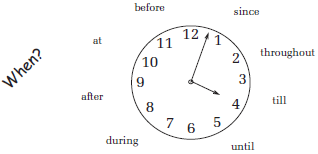Prepositions
Prepositions are words belonging to the part of speech that shows the relationship between a noun or pronoun and another word. Notice how English prepositions (italicized) show the space relationship between a bug and the straw:

- Bug #1 is on the straw. Bug #2 is under the straw. Bug #3 is inside the straw. Bug #4 is jumping over the straw. Bug #5 is walking around the straw.
English prepositions also show time relationships:

- Noah giggled before lunch, at lunch, during lunch, throughout lunch, after lunch, and until midnight. He's been giggling since yesterday!
Besides showing space and time relationships, English prepositions also show abstract (thought or idea) relationships. The English prepositions listed below show abstract relationships.
|
concerning |
except |
like |
regarding |
Simple Prepositions
Some English prepositions are single words while others are groups of words such as across from, along with, apart from, by means of, etc. In order to recognize and memorize single-word prepositions, simple prepositions, we list them alphabetically here.
|
aboard |
beside |
inside |
since |
Examples 1
Underline each preposition in sentences 1-3.
- Pilgrims aboard the Mayflower arrived at Plymouth Rock in 1620.
- Settlers in Massachusetts and throughout New England understood the importance of education.
- Barrett came from Martha's Vineyard with vivid descriptions of its beauty.
Solutions
- Pilgrims aboard the Mayflower arrived at Plymouth Rock in 1620.
- Settlers in Massachusetts and throughout New England understood the importance of education.
- Barrett came from Martha's Vineyard with vivid descriptions of its beauty.
Complex Prepositions
Listed below are some complex prepositions, which contain more than one word.
|
according to |
except for |
inside of |
Examples 2
Underline each complex preposition in sentences a and b.
- According to Mrs. Haroon, the neighbor who lived next to her mansion moved away from Smudgeville because of the smog.
- On behalf of the PTA, Mrs. Haroon stood next to the podium in front of the crowd in place of the president and presented me my plaque along with a trophy on account of all my hard work.
Solutions
- According to Mrs. Haroon, the neighbor who lived next to her mansion moved away from Smudgeville because of the smog.
- On behalf of the PTA, Mrs. Haroon stood next to the podium in front of the crowd in place of the president and presented me my plaque along with a trophy on account of all my hard work.
Object of the Preposition
A person, place, or thing always follows a preposition. We call this word the object of the preposition. Every preposition must have an object. Otherwise, it is not a preposition. We italicize prepositions and star their objects in the phrases below.
|
at the *corner |
down the *stairs |
Simple prepositions are underlined in the sentences below. Notice how they show the relationship between "went" and "fence."
The soccer ball went under the fence.
The soccer ball went over the fence.
In the first sentence, we see that fence is the object of the preposition under. In the second sentence, fence is the object of the preposition over.
Prepositions may have compound objects:
- Ivy hikes through *rain and *sleet.
- Gus thinks about *villains and *heroes.